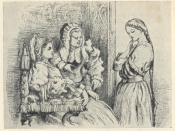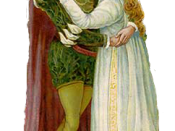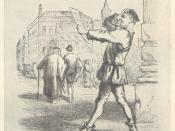In Shakespeare's play, Romeo and Juliet, Capulet is the father of Juliet and appears to be typical of fathers in the late 1600's as he was very demanding and controlling of his family, he was often keen to reaffirm his position as the leader of the family and treated his wife and daughter with little respect similar to that of household items which can be discarded when you feel they are no longer meeting your individual needs and desires.
The audience's first encounter with Capulet is in Act 1 Scene 1, where the two opposing families the Caplets and the Montague's are fighting in the streets of Verona. Capulet is accompanied by his wife and calls for his sword: "Give me my long sword, ho!". The short exclamation of "ho" Is Included by Shakespeare to convey to the audience Capulet's enthusiasm as he is not being drawn into the fight but actively participating.
His hatred towards the opposing family instantly becomes apparent as he is an old fragile man yet he is willing to fight. His wife Lady Capulet appreciates his fragile condition replying, "A crutch, crutch! Why call you for a sword?" Shakespeare's ability to produce wonderfully written plays, yet to have the intelligence to include humorous lines such as this is conveyed here as the audience will understand that his wife is implying he encounters difficulties walking never mind fighting. In this opening Act Shakespeare immediately conveys Capulet as a brave, courageous old man whilst informing the audience of the long drawn out feud between these two opposing families who due to the feud have both lost loved ones. Capulet appears to the audience as a man who has more pride than sense as it seems he would rather die than be defeated by the Montague's. This...


